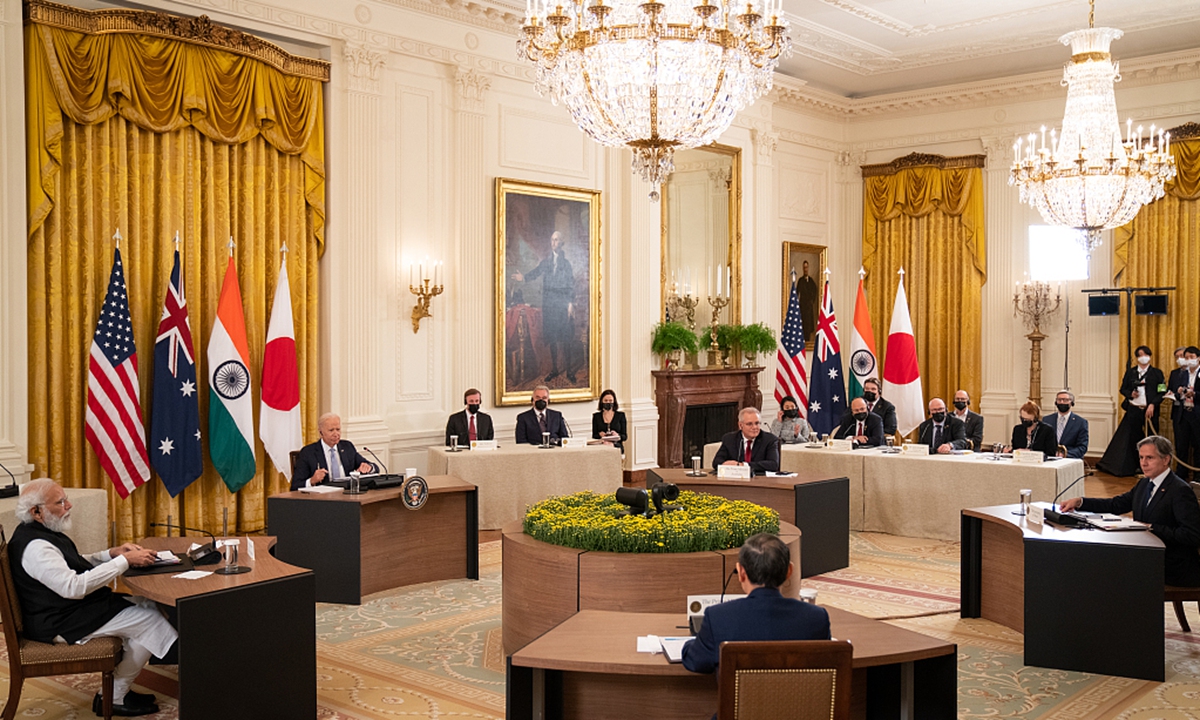1st Quad summit tacitly targets China but US 'can't coordinate members' differences, doomed to fail'

Photo: VCG
The leaders of the US, Japan, India and Australia — known as the Quad — finished their face-to-face meeting in Washington on Friday in an attempt to cement ties while containing China, but experts said that an interlude during the meeting involving US President Joe Biden complaining about his translation device malfunction is an omen of the emerging anti-China clique's future — that it cannot function at all due to US' declining capability and changes of the global situation.
The Friday meeting focused on topics including vaccines, climate, cooperation on technology and space without mentioning the words "China" or "Beijing" in opening remarks heard by reporters, but China was "the subtext of most of the group's agenda," the Washington Post reported.
Biden said the countries were "coming together to take on key challenges of our age, from COVID to climate to emerging technologies" and he added in his opening remarks at the meeting that "we know how to get things done, and we are up to the challenge."
Australian Prime Minister Scott Morrison echoed Biden's remarks, saying "we believe in a free and open Indo-Pacific, because we know that's what delivers a strong, stable and prosperous region."
Outgoing Japanese Prime Minister Yoshihide Suga also attended Friday's meeting and said that the Quad is "an extremely significant" initiative by four countries "who share fundamental values, cooperating for the cause of realizing a free and open international order based on the rule of law in the Indo-Pacific."
Although the leaders of the four countries did not mention China and were trying to play down disputes with China, the entire agenda and all topics in the summit focused on China. It is an initiative that aims to incite disputes and confrontation under the banner of cooperation especially in the Western Pacific, Li Haidong, a professor at the Institute of International Relations of the China Foreign Affairs University, told the Global Times on Saturday.
By stressing cooperation on vaccines and dealing with pandemic, the US and the other three countries want to hide their true purpose and win international support, but such low-level tactics have been seen through by China and the international community, Li said.
The US wants to show solidarity and coordination among the four members as it tries to shore up competition with China. "Biden wants to avoid confrontation with China amid an already tense competition and is making provocations against China. But the fact is that he is incapable of handling the delicate situation," Li said.
Analysts said that some details of the Quad summit also showcased the US' incapability of fully drawing members to its anti-China fleet.
According to US media, US Secretary of State Antony Blinken also attended the meeting with leaders from the four countries.
Li noted that Blinken's presence also showed that it is Blinken who is pushing the Quad initiative and he was there to make up for Biden's incompetence of grasping overtones of other three leaders. Biden is also incapable of persuading the members to closely follow the US to contain China as changes in US domestic politics could lead to different diplomatic policies, and US allies would have to swallow the bitter fruit of being abandoned by the US.
The move to not mention China at all also displayed the disputes among the Quad countries as they may share similar views of not wanting China to rise but differ with each other on policies toward China, Sun Chenghao, an adjunct fellow from the Center for International Security and Strategy in Tsinghua University, told the Global Times on Saturday.
Although the summit looks like a jollification, it is difficult to coordinate the four to speak in one voice or act at a similar pace in containing China, Sun said.
An interlude is worth mention as Biden told a working staff that he couldn't get his translation device "to function at all." The remarks were spoken through his mic and heard by leaders from the other three countries. Some analysts mocked that Biden's words were more like an omen for the future of the Quad, which is doomed to fail.
Sun noted that the Quad summit is the Biden administration's latest move to form an alliance to contain China. But all these different coalitions with different allies will not achieve a good effect as the US' focus is scattered and it has stirred up dissatisfaction among allies.
The Quad summit took place just days after the US, the UK and Australia announced a security pact, AUKUS, under which Australia will be provided with nuclear-powered submarines after ripping up its deal with France, which prompted France to recall its ambassadors to the US and Australia, and greatly upset the European Union.
AUKUS cast a shadow over the Quad summit, and will dilute the Quad members, especially Japan and India, and make the summit less effective, analysts said.
Tanvi Madan, head of the India Project at the Brookings Institution, was cited by the Washington Post as saying that the formation of AUKUS and the Quad summit this week showed the outlines of two anti-China blocs were emerging in parallel. While AUKUS has the appearance of a more hard-edge military pact, the Quad is emphasizing soft-power projects like vaccine distribution in Southeast Asia, where many governments resist the idea of choosing between Washington and Beijing.
Sun noted that the US should be clear that its strength and global influence are declining with tons of domestic problems needing to be solved urgently; for example, the debt ceiling, and the global situation has changed with most countries not wanting to pick sides between China and the US. The US could not form an anti-China coalition like what it did to the Soviet Union during the Cold War.

